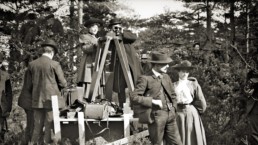‘Be Natural: The Untold Story of Alice Guy-Blaché’ Review: The First Female Filmmaker
This is a custom heading element.
BE NATURAL: THE UNTOLD STORY OF ALICE GUY-BLACHÉ (2019)
Starring Alice Guy-Blaché, Jodie Foster
Directed by Pamela B. Green
Distributed by Zeitgeist Films in association with Kino Lorber. 103 minutes. Not Rated.
In the opening moments of Be Natural, director Pamela B. Green drops us into an animated rendering of present-day Hollywood, then visually winds back the clock of cinematic history to the late 1800s. With this stunning and impressive visual entrance into our story, the effect is twofold. First, it establishes the incredible motion graphics driven style we’re about to bask in for the film’s runtime. Green previously made title sequences for scores of big Hollywood movies, and her mastery of the motion graphics medium is in full force here. Second, on a more metaphorical level, this rewind speaks to the heart of the message: for generations, movie lovers have learned about the history of cinema as a constructed story. Perhaps, as we learn here, this story was modified to propel or diminish certain filmmakers. Who were the filmmakers that historians omitted in order to fit their agenda?
In late 1800s Paris, the same time at which the Lumiere Bros. and Georges Melies were making the first moving pictures, another filmmaker, Alice Guy-Blaché, was also writing, directing, and producing the first motion pictures. Yes, this makes Guy-Blaché the first female film director, yet before this movie, she’s never been placed in the history books as such. Using meticulous citation and multimedia evidence to back these claims, the film makes a case for not only why she was forgotten, but why she needs to be remembered.
Not only is the film a story of Guy-Blaché, but time is equally allotted for the investigative journey to tracking down all this information. These sequences are thoroughly engaging for people who do similar types of field work, and presumably for anyone who enjoys a window into the process. Had this information been compiled before, we’d already know it – therefore it’s equally valuable to know how the film came to be. It’s at times a dizzying array of interconnected intel, yet even if you can’t keep up with all of it, it plays like fireworks thanks to the aforementioned masterful graphics.
The investigation is intercut with the narrative of the findings themselves, which is the history of Guy-Blaché’s life. These sections are narrated by Jodie Foster, whose French proficiency is on full display. Pioneering examples of story structure, editing, color, sound, and other essential contributions to film innovation are clearly shown in Guy-Blaché’s body of work. A particular moment I enjoyed was how she filmed turning on a lantern: when it’s off the film cell is colored blue, then it cuts to an orange colored cell once it turns on – an early example of using the technology and editing to tell a relatable story. I would’ve liked to see more of Guy-Blaché’s work play out in full: the moments where the film allows it to do so are stunning with the surrounding context. Perhaps Kino Lorber or another specialty distributor will make Guy-Blaché’s films commercially available after this film – here’s hoping.
The end result feels like a crossover between Finding Vivian Maier and Dawson City: Frozen Time, two of my all-time favorite documentaries, each with an engaging, investigative look at history (and in the case of Dawson City, both deal with the birth of cinema). We’re at a time where it’s increasingly clear how fragmented or revised our understanding of history is, and it’s made unfortunately clear that a lot of that has to do with the patriarchal structure that continues to diminish the voices of female filmmakers. Be Natural is an imperative affirmation that female filmmakers have been making groundbreaking movies since the beginning of the medium, and should be recognized for the massive contributions they’ve added to this beloved art. Be Natural is a must-see for movie enthusiasts and will begin the amendment of film history to include Alice Guy-Blaché’s name in the highest echelon for innovating the craft.
Be Natural: The Untold Story of Alice Guy-Blaché is now playing at Laemmle’s Monica Film Center.
H. Nelson Tracey
Nelson is a film director and editor from Denver based in Los Angeles. In addition to writing for Cinemacy, he has worked on multiple high profile documentaries and curates the YouTube channel "Hint of Film." You can check out more of his work at his website, hnelsontracey.com

